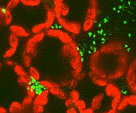Plant Pathology, Department of

Department of Plant Pathology: Faculty Publications
Document Type
Article
Date of this Version
7-2009
Abstract
Paramecium bursaria Chlorella virus-1 is an icosahedrally shaped, 1,900-Å-diameter virus that infects unicellular eukaryotic green algae. A 5-fold symmetric, 3D reconstruction using cryoelectron microscopy images has now shown that the quasiicosahedral virus has a unique vertex, with a pocket on the inside and a spike structure on the outside of the capsid. The pocket might contain enzymes for use in the initial stages of infection. The unique vertex consists of virally coded proteins, some of which have been identified. Comparison of shape, size, and location of the spike with similar features in bacteriophages T4 and P22 suggests that the spike might be a cell-puncturing device. Similar asymmetric features may have been missed in previous analyses of many other viruses that had been assumed to be perfectly icosahedral


Comments
Published in Proceedings of the National Academy of Sciences USA 106:27 (July 7, 2009), pp. 11085–11089; doi: 10.1073/pnas.0904716106 Copyright © 2009 National Academy of Sciences USA. Used by permission.